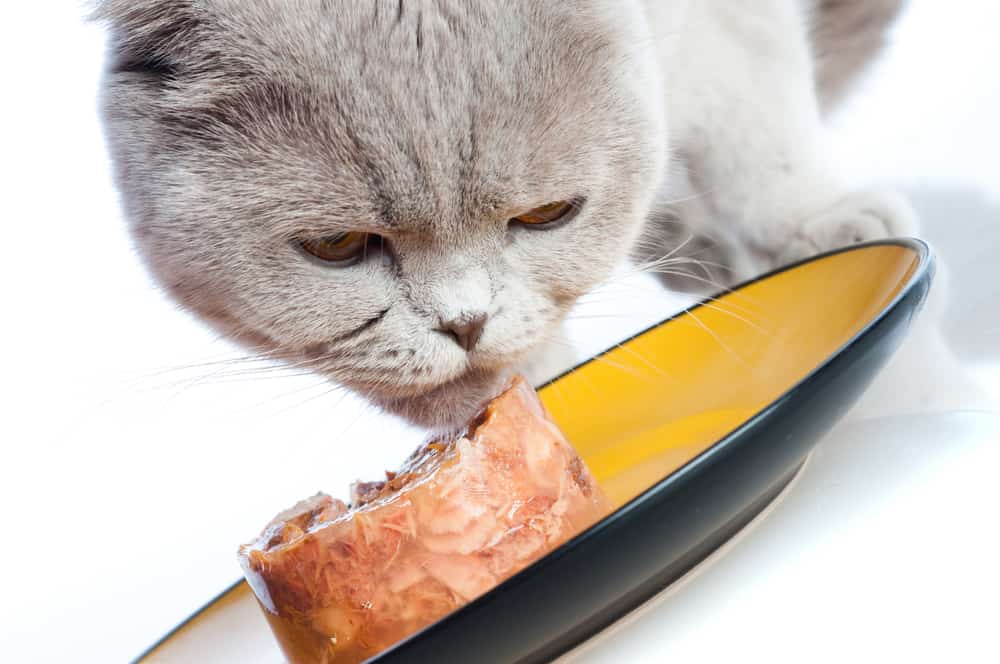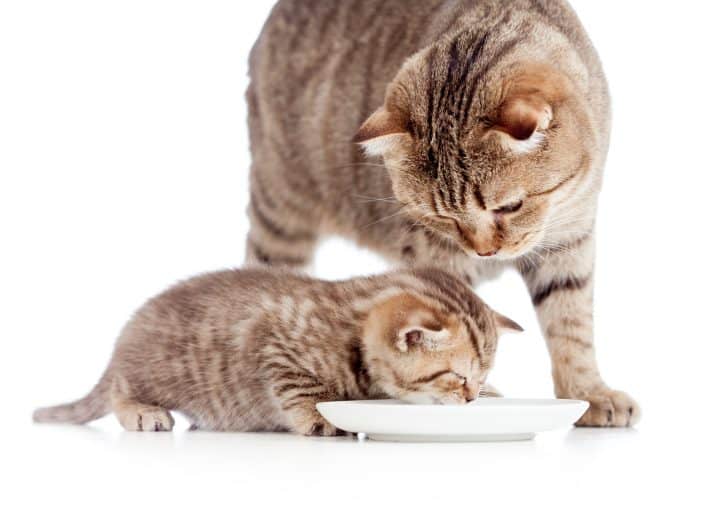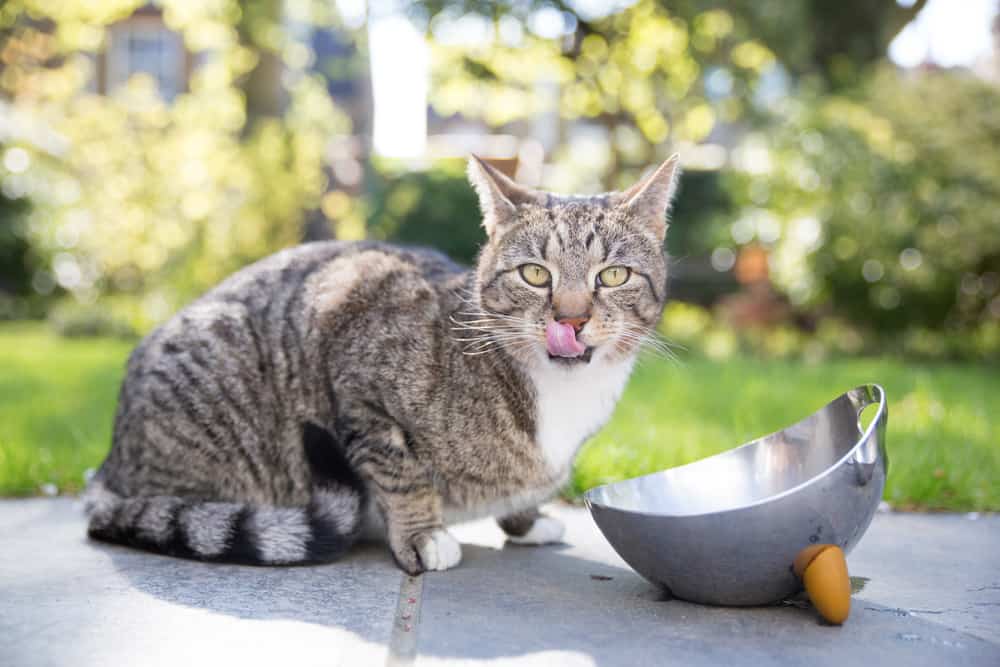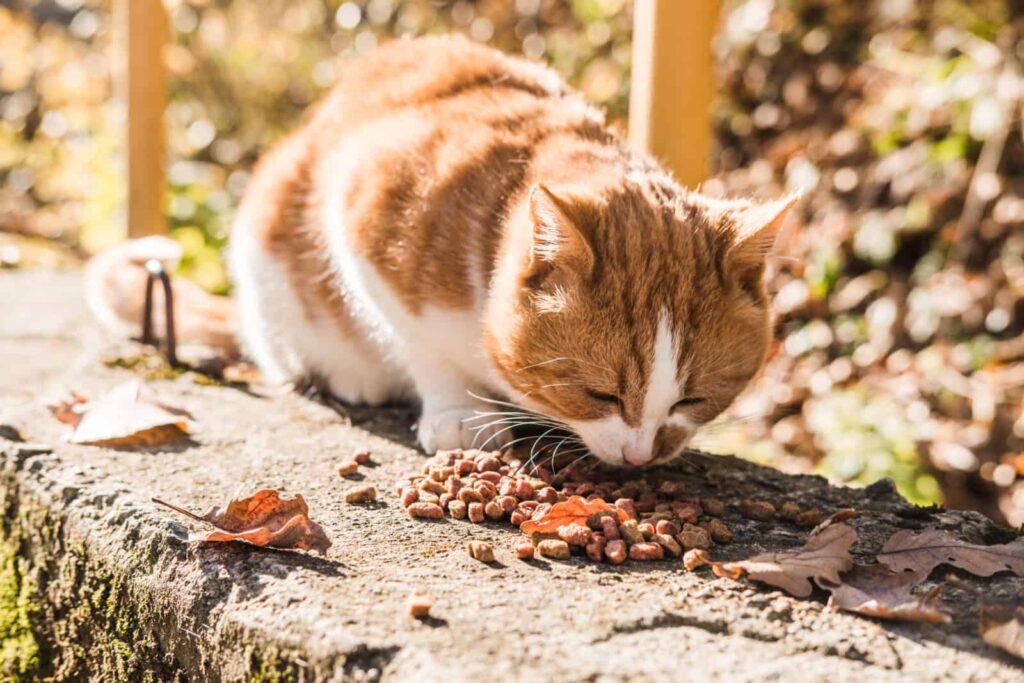How long can kittens go without food? Cats can go up to two weeks without eating as long as they have access to water, but even then, they’ll probably only last three to four days.
It is crucial to stress that a cat can become malnourished and ill if they go without food for even two days when it comes to cat health. Every cat needs a consistent food source to stay strong and content.
If a cat doesn’t eat, it may develop hepatic lipidosis, a liver disease that can be fatal if left untreated, and many other medical conditions. And no cat owner wishes that upon their cat!
Learn how long cats can go without eating or drinking, the side effects of it, as well as how to encourage your cat to start eating again.
Now, let’s check how long cats can go without fresh water or food and how to help a kitten to start eating again if it suffers from a lack of appetite.
How Long Can Kittens Go Without Food?
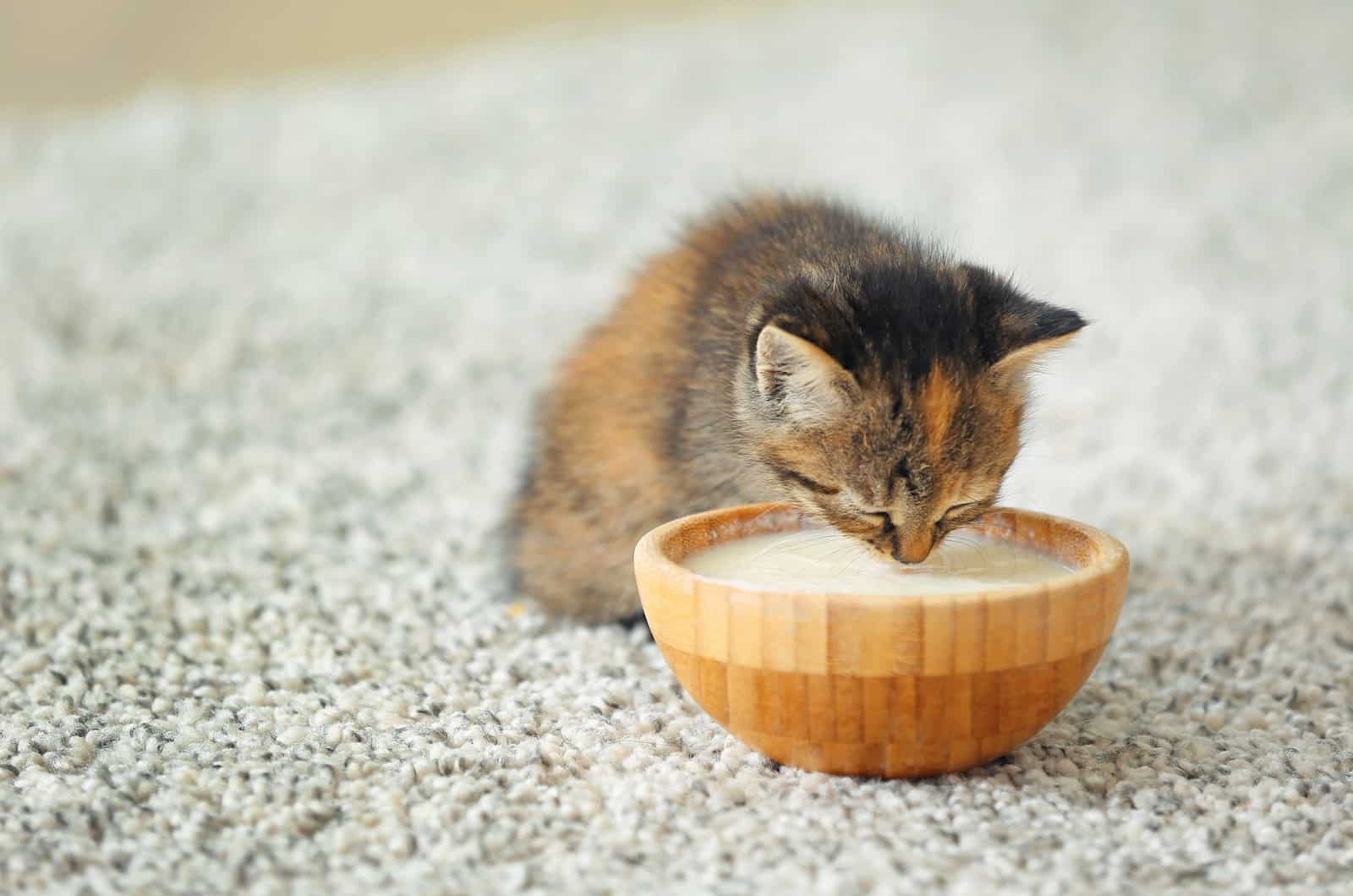
One of the most exciting times is getting a new kitten. It is normal that, as cat owners, we care about our cat and everything she does, and that also includes their feeding schedules and other things.
I did some research to learn exactly how often a kitten needs to eat, and everything else a pet owner should consider. How long can kittens go without food to clear once and for all?
A typical healthy kitten can typically go up to two days without eating. However, if they don’t eat for a day, they will become weak and malnourished, and they’ll probably need immediate veterinary care. Due to their small stomachs, it is required that they’re fed frequently to get proper nutrition and energy.
Additionally, it’s crucial that they are fed the proper food for their size and age. For example, newborn kittens completely rely on their mother’s milk in the first few months of life to provide them with the nutrition they require.
At four weeks, the breeder takes over responsibility as the kitten weans off the breast milk, and at eight weeks, you become the owner again. The details are crucial. Cats and kittens should be fed based on their life stage, size, and age. This includes the actual food’s type, the quantity served, and the timing.
As a result, as your kitten and cat mature, you, as the owner, will need to continually adjust their diet. One of those inevitable facets of ownership, really.
Our kitten feeding chart by age can be a helpful tool for you here.
Now, let’s examine how long a kitten can go without eating at various ages in more detail. We’ll also examine whether it’s typical for a kitten to ignore their food and some doable tactics to get them to eat.
In addition, proper nutrition will support their development and growth. Keep reading to learn everything you need to know about feeding a cute little kitten if you’ve just adopted one.
How Long Can A Kitten Go Without Feeding?

How long can newborn kittens go without eating? It is known that the kitten needs to eat a lot, especially if it’s really young, and needs to be fed different food in its life stages.
We will now see the feeding chart for up to 8 weeks.
| Age | Type of Food | Feeding Frequency |
|---|---|---|
| 1-3 Weeks Mothers | Milk | KMR (Kitten Milk Formula) |
| 3-4 Weeks | Mothers Milk + Introduction to solid foods via mush. 7x per day. | 7x per day |
| 4-5 Weeks Mothers | Milk and mush | 6x per day |
| 5-6 Weeks | Mush | 5x per day |
| 6-7 Weeks | Wet and Dry Food | 4x per day |
| 7-8 Weeks | Wet and Dry Food | 3x per day |
| 8 Weeks | +Wet and Dry Food | 2-3x per day |
You have a job to monitor your kitten’s growth and feeding schedules, how does she respond to amount and type of food, servings, and much more.
It’s crucial that you keep an eye on your kitten’s growth and responses to feeding and adjust the serving sizes as necessary. Until they are weaning age (about three to four weeks old), kittens need formula. For instance, kittens should never be bloated but rather full.
Therefore, it’s crucial that you cover your kitten’s previous diet, weaning status, and development when you adopt them.
Ask veterinarians for advice on the best brands of food to feed your cat, how often to give them, and whether there are any particular foods your cat prefers or dislikes. However, you’ll probably aim to feed your kitten 2-3 times per day, using a mixture of wet and dry food.
Interesting Read: 5 Effective Home Remedies For Bloated Cats
Feeding Your Kitten

• Feeding schedule. It makes it easier to manage and control the diet and ensure that they are only eating as much as they need, neither too little nor too much. Try to be as consistent as you can.
• The only kind of milk you should use to soften food and encourage a kitten to eat is special kitten milk (KMR). Milk substitutes and dairy products should not be given to infants.
• By the time they are 6-7 weeks old, kittens’ stomachs have grown to only the size of an acorn. They require feeding on a regular basis in small doses.
• By the time they are 6 months old, you should try to reduce the servings to 2 meals per day. Avoid making any abrupt dietary changes, as these can lead to digestive problems.
• Avoid giving her cow’s milk because it can harm her health and digestion. Kittens can consume milk-substitute formula, yes. However, avoid giving them cow milk because it could cause indigestion.
• The maximum amount of time that wet food should be left out is 30 to 60 minutes. If there is any food left over, dispose of it and wash the bowl well. Never leave wet food outside overnight, and dry food also.
You will eventually have to decide whether or not to always leave food available for your adult cat. But keep in mind that if you establish a feeding schedule, you’re also helping yourself because it will be easier later on.
What Should Kittens Eat?

You might be wondering at this point what particular foods a kitten should eat. We’ve already established that kittens’ nutritional needs differ from those of adult cats.
Therefore, you must give young kittens food that is specifically formulated for them. Fortunately, the law requires pet food labels to specify the life stage for which the food is intended.
Therefore, food will always be advertised as “kitten” or included it in the title. Your kitten can eat either dry or wet food, depending on their preference. Furthermore, each has benefits and drawbacks.
Kitten prefers wet food in general, and it keeps them hydrated, especially if they are not drinking much.
However, dry food is much more practical and convenient for you as the owner and lasts much longer when placed down, and typically contains more carbohydrates than wet food, making it the food most likely to result in weight gain if overfed. You should also be aware that some cats will refuse to eat wet food.
Always keep in mind that your kitten’s and, later, your cat’s nutritional needs are primarily influenced by the following:
• Weight and size
• Age and stage of life
• Overall health
• Activity levels
• Spayed or neutered
Is It Normal For My New Kitten To Not Eat?

It is typical for a kitten to go without food. This is particularly true if something has changed, such as when you are transitioning their diet or have just acquired them.
The following are typical explanations for a kitten ceasing to eat:
• Dental problems: Kittens can develop dental problems such as tooth decay or gum disease, which can make it painful for them to eat.
• Infections: Kittens can develop infections in the mouth or throat, which can make it difficult for them to eat.
• Digestive issues: Kittens may have digestive issues such as constipation or diarrhea, which can make them lose their appetite.
• Stress or anxiety: Kittens may stop eating if they are stressed or anxious, such as if they are in a new environment or are being separated from their mother.
• Other medical issues: Kittens may stop eating due to other medical issues such as kidney disease, liver disease, or pancreatitis.Feline pancreatitis can be so severe that it can lead to some owners having to put their cats to sleep.
• A kitten that is new to the food needs to be introduced to it gradually. If it is abruptly changed, your kitten might become anxious and lose appetite due to the new food.
• Something unsettling about the surroundings; kittens and cats can be picky about where they eat. Ensure that they can eat in a peaceful, serene, and comfortable area of your house. Their food and water bowls should never be put near the litter box!
• They are being fed excessively; make sure your kitten is receiving small, appropriate serving sizes. Watch out for treats.
• Your kitten is stressed, which can be brought on by a number of things. Dog chasing, car travel, new sights, and smells, going to the vet, etc.
• Cats and kittens prefer to eat from clean bowls; they are very clean animals. Another reason for them to delay is any leftovers from a previous meal.
If this is the case, you could see your cat scratching the area around its food.
• Food bowls must be wide and shallow because cats generally dislike it when their whiskers touch the bowl’s sides because it irritates them.
If you are concerned that your kitten has stopped eating, it is important to consult a veterinarian as soon as possible to determine the cause and receive appropriate treatment.
What Happens If A Kitten Doesn’t Eat?

The length of time a kitten goes without food and whether or not they are drinking any water during this time determine what happens to them. Their age and size also play a role.
Lethargy and other consequences of insufficient energy intake may soon result from this, and it might occur in a matter of hours. From there, things for your kitten could get significantly worse. Unfortunately, if cats are not fed enough, they can quickly experience organ failure.
Cat’s livers don’t allow them to sustain their bodies without food as they allow to other animals and humans. In other words, they are not very good at utilizing their body’s energy reserves. Only 4–12 days without food are sufficient for older cats to survive.
Due to their faster metabolisms and greater energy requirements, kittens can reach this stage in as little as two days. In either case, the process is the same, and organ failure is primarily to blame. The digestive system comes first, followed by the brain, the kidneys, and finally, the heart.
Hepatic lipidosis may be the main health issue if not eating continues for a long period of time. Long-term starvation or other dietary deficiencies are the main causes of it.
While everything may sound very alarming, it’s usually not a problem if your kitten skips a few meals. Therefore, it’s crucial that you keep an eye on your kitten’s food intake.
It is best to call a veterinarian if you think something is wrong with your kitten or if they go longer than 4 hours without eating. They will, at the very least, be able to look over your kitten and give you comfort.
Last but not least, keep in mind that if your kitten generally does not eat enough, they will be denying themselves vital nutrition to support their growth and development.
How Can I Get A Kitten To Eat
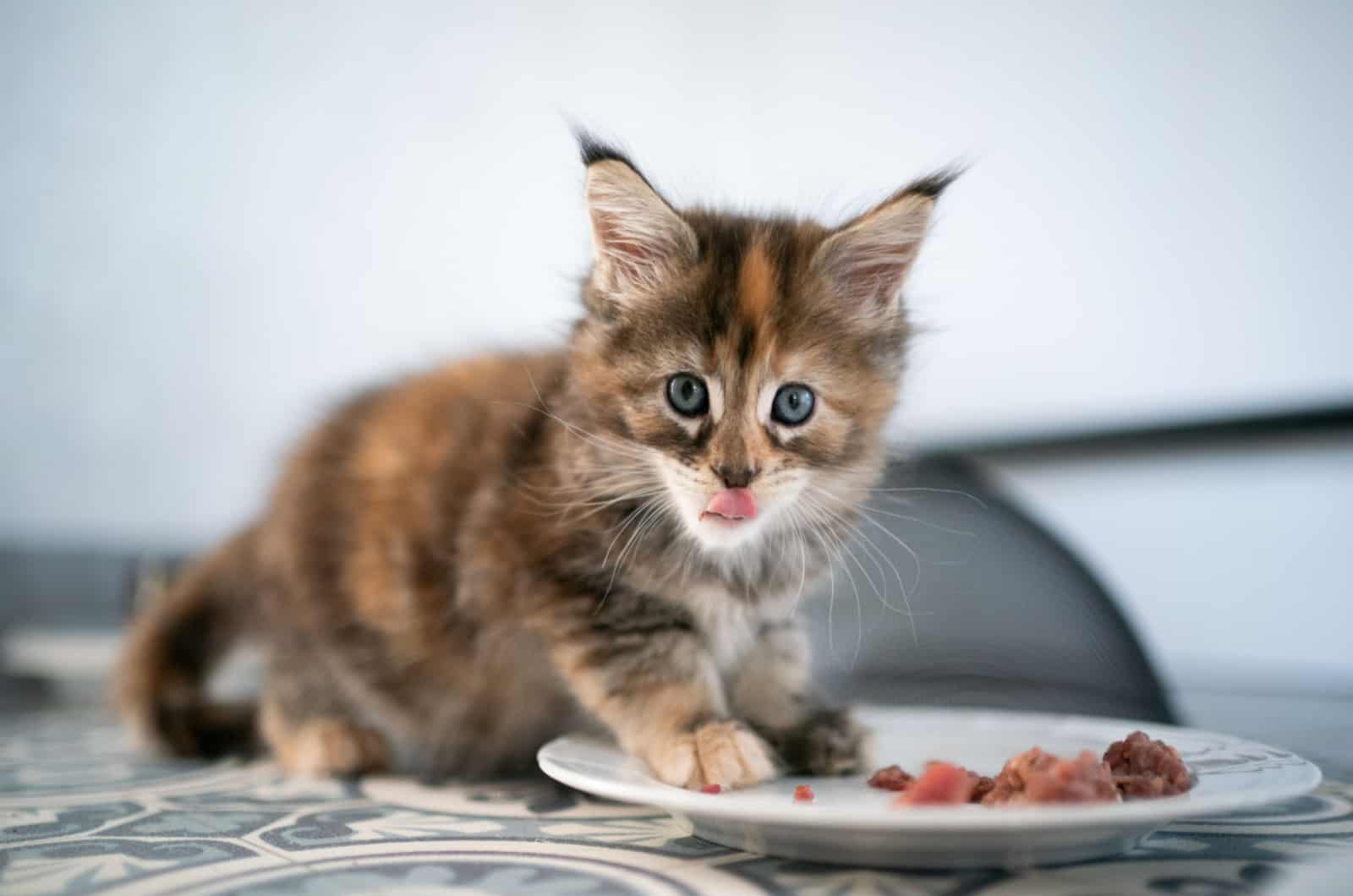
What to do when you have proper food to feed your kitten, but your kitten avoids eating?
• Offer a variety of foods: Kittens can be picky eaters, so try offering a variety of wet and dry foods to see what they prefer. You can also try different flavors and brands to see what they like.
• Make sure the food is at the right temperature: Kittens may be more likely to eat if the food is warm, so you can try microwaving it for a few seconds to take the chill off.
• Serve small meals frequently: Kittens have small stomachs and may prefer to eat smaller meals more frequently.
• Use a shallow dish: Kittens may have difficulty reaching into deep dishes, so try using a shallow dish to make it easier for them to access the food.
• Offer a variety of treats: Kittens may be more likely to eat if they are offered a variety of treats, such as small pieces of cooked chicken or turkey or small amounts of canned tuna or salmon.
• Consult a veterinarian: If you have tried these strategies and your kitten is still not eating, it is important to consult a veterinarian as there may be an underlying medical issue that needs to be addressed.
RELATED: How To Feed Your Cat Wet Food While Away
What Should I Feed My Kitten?

Compared to cats, a kitten requires more calories than usual. For better growth, their diet should be rich in protein and fat. These formulas can be used to serve them.
This is the plan:
• 0-4 weeks: During this time, a kitten typically drinks its mother’s milk, but if for any reason the mother cat is unable to do so, give the kitten milk replacement formula. Avoid giving her cow’s milk because it can harm her health and digestion. This time frame is critical.
• 4–5 weeks: In this period, you can give her milk and some solid food. It ought to be a liquid. Your cat needs time to adjust, so add the solid very gradually. She is still not picky like a cat, so that you can give her various choices.
• 6 – 8 weeks: Your cat can now eat proper solid food after 6 to 8 weeks. Serve them three to four times daily.
• 8 weeks or more: At this point, your cat is sexually mature and active, and your cat should be able to enjoy canned food.
RELATED: Is It OK That My Kitten Keeps Eating My Older Cat’s Food?
Wrapping It Up
How long can kittens go without food? As they must feed newborn kittens, pet owners shouldn’t consider this question at all. Only kitten formula should be used for bottle feeding, and kittens require frequent small meals.
They require a lot of energy, and their bodies are unable to sustain them for very long without consistent and routine access to food and water. You should always keep your new kitten warm, and their core body temperature should be close to 101 °F. Covering them in blankets or towels will help them stay warm.
The diet should be more “liquid-based.” The fact that a kitten’s and cat’s diet changes are arguably one of the most crucial things to keep in mind and take into account. You’ll need to adjust what, when, and how much food you feed them frequently.
The nutrition of a kitten or cat depends on so many different things that it does require some advanced planning, research, and preparation.
Remember, the kitten should never be without food for more than 12 hours at a time. It is strongly advised to call a veterinarian as soon as possible if you are doing your best to encourage appetite and have tried several different methods without success.
The last resort should always be force-feeding because it can be painful. They will be able to provide fluids to at least stop dehydration. However, even if unusual methods are required, they will be able to guarantee that your kitten’s nutritional needs are met.
Related Content
How To Feed Your Cat Wet Food While Away


